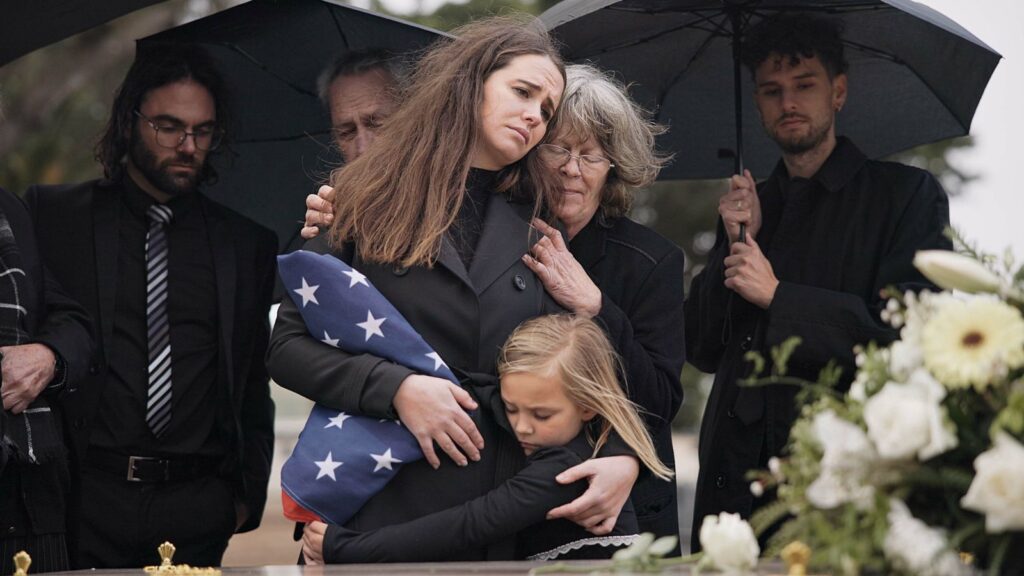Grieving is a process that everyone processes differently. For those who are going through it, sometimes they don’t even know what emotions they’re experiencing. Grief is like a tornado of hurt inside that just circles without knowing how to get out. Anger, disbelief, sadness, so many things going on at once that no one is quite sure what to say to ease a grieving person’s pain. When confronted with a situation where we don’t know what to do or say, often we look to cliches that are supposed to make people feel better. They rarely ever do. Instead of saying these cliche sayings, simply say, “I don’t know what to say.”
“Everything Happens for a Reason”

Everything might happen for a reason, depending on what you believe or what you’ve experienced. But experience also tells us that that reason is not always good, and it definitely isn't always fair. Even if you think there is a reason why the person standing in front of you lost someone they love, keep it to yourself.
“God Only Gives You What You Can Handle”

Although being a verse in the bible, the meaning is when people use it out of context or as a means to tell someone that they are “strong enough” to handle what they have to. For the record, in that sense, people have been given way more than they can handle. When you say that to someone, it almost comes across as if they deserved it because they were strong enough to handle it. That won’t make anyone feel better.
“They Lived a Full Life”

Whether you lost your parent or your 100-year-old grandparent, acknowledging that they lived a full life doesn’t help. Saying that someone enjoyed themselves enough when they were here will not distract from the pain that someone has at never seeing them again. We all know at some point, life comes to an end, but that doesn’t mean that it hurts any less, regardless of how old they are or how much people should’ve seen it coming.
“I know Exactly How You Feel”

We can all empathize with someone who has lost a loved one, but there is no way to really get into someone’s head to understand how they feel. When you say, “I know exactly how you feel,” it makes a person feel as if their pain is standard and not special. Grief is a feeling that you want to be personal to your experience, and no two people ever feel the same because no two people ever lose the same person.
“You’ve Got to Be Strong”

Grief comes with a lot of emotions. Some of them can take you down in ways you didn't even know you could be. Almost everyone wants to be strong, and most have obligations and responsibilities like others looking to them to make it okay. If someone needs to fall apart, then let them. That doesn’t make them weak; being vulnerable and processing pain is the strongest thing anyone can do. When you point out the fact that, by showing emotion, they are somehow letting others down, that puts a lot of guilt and shame on a person who is already suffering emotionally.
“You Have to Move on”

Grief has stages that everyone experiences and goes through differently. Not everyone goes in a straight line, and not all go through all of the stages perfectly. There is no set time when someone feels like they are done grieving. For many, grieving lasts a lifetime. When you tell someone to move on, you make them feel like they are somehow holding onto something they shouldn’t. For some, losing someone is something they will and should hold onto forever if that is what is in their heart.
“You’re Still Young, You Will Love Again”

When someone loves their significant other and partner, pointing to the fact that they can love again is not what you should do during the bereavement process. There are a lot of feelings that go through your mind when you are grieving. Feeling like someone can be replaced somehow is not one that you are comfortable with. After just losing the person you love, considering replacing them feels like a betrayal.
“You Can Still Try Again”

Science tells us that 10 to 20% of all pregnancies end in miscarriage. Although a miscarriage might seem like a couple of weeks for the outsider, in those weeks, parents have already named the baby, had dreams for their future, and welcomed them into their hearts. Saying things like “You can try again” negates the fact that they lost a little human being and a soul that, like a significant other, can never be replaced. Sometimes, pointing out the obvious isn’t what people need or want. They already know.
“They’re In a Much Better Place”

We would all like to believe that there is an afterlife where we get to enjoy peace and joy for eternity. Not all of us have the same notions about what happens after death. Even for those who do believe in the afterlife or heaven, saying, “They’re in a much better place,” doesn’t help because no matter where that place is, it isn’t by a grieving person’s side. It doesn’t make someone feel better sometimes to try to explain where someone who passed may or may not be. A grieving person is still focusing on the fact that they are no longer here.
“They Would Want You to Move On”

When someone dies, there is a survivor’s guilt that you feel about moving forward with your life and even being here to do so. When someone says, “They would want you to move on,” that doesn’t ease a grieving person’s mind. Again, if you try to push someone past their feelings and don’t allow them to process and sit in sadness, they will likely carry residual feelings they don't ever deal with forever.
“It Was Their Time”

How? How does anyone who says it was their time know that it was their time? For a grieving person who is probably already struggling with anger, someone coming along and sounding like there was some master plan that they know about and how it was supposed to go just makes the anger solidify. For the grieving person, it doesn’t matter if it was their time or not; it is still unfair that they are gone.
“You Should be Thankful For the Time You Had”

Along the lines of “It’s better to love and lose than to never have loved,” the only person who can say that is the person who isn’t grieving and feeling like their heart is going to break. Obviously, a grieving person is thankful for the time that they had with their lost loved one, but much like a half-full versus a half-empty glass, it is half full, and it is okay to want it full as you had it before. Comparisons and trying to make people feel guilt at not being grateful, at a time when you are devastated, is not a good way to go about making someone feel better.
“At Least They Aren’t Suffering”

When you watch someone you love suffer before they pass, it adds a layer of guilt. When you are in the midst of it, it is natural to wish that they can find peace. Once they pass, you realize that you lost the person you love so dearly and almost feel guilty for wishing them not here anymore. When someone says, “At least they aren’t suffering,” it reminds you of the pain that you watched before they passed and the guilt of wanting them to pass, to begin with.
“People Are Depending on You”

When you lose a partner and you share children, you are keenly aware that people are depending on you to be strong. Grieving isn’t a choice, and no matter how hard we want to be there to pick others up and to make it okay, sometimes we can’t make it okay. When you remind someone that they are failing the people they love, it will not hasten them through it; it just brings on more guilt and shame at not being the person they think they should be for everyone else.
“Remember the Good Times”

When you are going through your roughest moments in life, that is not a time when you can or should focus on the good times. For someone to go through the grieving process, they have to go through the really rough and devastating moments to come out the other end to remember the good times. If you force them to intertwine, you might muddle the good with the bad. They will eventually remember all that they had. Let them feel sorry for themselves for as long as they need to.
“It's God's Plan”

Like so many other phrases that people utter when they don’t know what to say, saying “God’s plan” doesn’t make the sadness, anger, and hurt go away. If it was indeed God’s plan, then what do you do with that? You are angry that your loved one is gone, and then you’re angry because it was part of a plan that you are not okay with. If you have beliefs about the afterlife, fate, or convictions, keep them to yourself. Let the grieving person believe what they want and have to in the moment.
“You Knew That It Was a Matter of Time”

When someone has a terminal illness, you know they are not going to make it, but that doesn’t mean you have come to terms with it. When someone says, “You knew,” it negates that even if someone did know, it is still devastating. There is truly no way to “prepare” yourself for losing the person you love. Even if they were living on borrowed time, you convince yourself it will never end because you just don’t want it to.
“Focus on Your Other Children”

When you lose a child, there is often a sense that a grieving parent isn’t acknowledging their blessings by focusing on the loss. Each child brings into the world a different type of love and a new soul. Of course, you are thankful for every child you’ve been blessed with, but when you lose one, to focus energy on the others instead of mourning the loss feels disrespectful. There will be time in the future to be okay when the energy flows elsewhere, but in the here and now, you need to focus on healing, whatever that looks like.
“You Need to Take Care of Yourself”

When you are a caregiver, there is no you. Some grieving people appear to be okay on the outside. They go into action planning, taking care of logistics, and making everyone else feel better. Those people are doing it to protect and save themselves. When you say things like “You need to take care of yourself,” you remind the grieving person that there is something they should be taking care of, some feelings they should be feeling, or that they need to stop. Sometimes, the only way to survive is to stay in motion, so let them.
Grieving is not anything describable because no two people do it the same, while some seemingly never do it at all. If there is one thing that a grieving person needs, it is space. Often, humans tend to not know what to say to ease someone’s burden. The best advice that anyone can ever give is that if you don’t know what to say, say so. Falling back on cliches that probably haven’t ever been helpful and never will is never the way to go.
30 Traditional Sayings That Are Now Considered Offensive by Woke Culture

30 Traditional Sayings That Are Now Considered Offensive by Woke Culture
21 Habits Often Associated With Having a Lower Social Status

21 Habits Often Associated With Having a Lower Social Status
25 Social Issues Gen Z are Determined to Cancel

